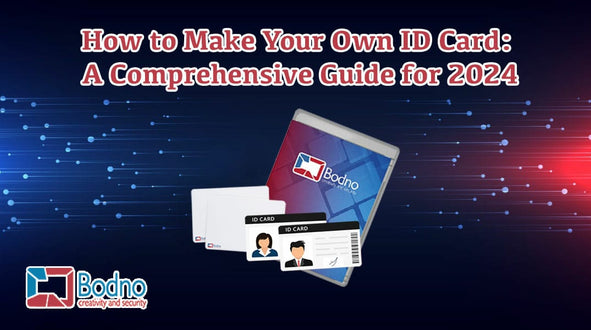Creating your own ID cards has become increasingly accessible, whether for business, educational, or personal use. With advancements in technology, anyone can now design and print high-quality identification cards from the comfort of their home or office. This guide will walk you through the essential steps to make your own ID, leveraging effective communication principles to ensure clarity and efficiency.
Understanding the Basics
Before diving into the process, it’s crucial to understand why you might need to make your own ID card. Common uses include:
- Business Purposes: Employee badges, visitor passes, and contractor IDs.
- Educational Institutions: Student IDs, library cards, and event passes.
- Personal Use: Membership cards, custom photo IDs, and novelty IDs like the famous McLovin ID.
Benefits of Creating Your Own ID Cards
- Cost-Effective: Printing your own ID cards can save significant costs compared to outsourcing.
- Customization: Full control over the design and information on the card.
- Convenience: Ability to print on demand without waiting for external providers.
Step-by-Step Guide to Making Your Own ID Card
1. Choose the Right Tools and Materials
To get started, you need the right tools and materials:
- ID Card Printer: Invest in a high-quality plastic card printer. Popular options include Bodno's range of ID card printers.
- Card Design Software: Software like Bodno ID Card Software offers intuitive design interfaces that simplify the process.
- Blank ID Cards: PVC cards are standard for durability and quality.
- Accessories: Badge holders, lanyards, and clips as needed.
2. Designing Your ID Card
Design is a critical aspect of creating an effective ID card. Here are some tips:
- Clarity and Readability: Ensure that all text is legible. Use contrasting colors for text and background.
- Brand Consistency: Use your organization’s logo, colors, and fonts.
- Essential Information: Include necessary details like name, photo, role, and contact information.
Using Bodno’s software, you can easily drag and drop elements, import images, and add barcodes or QR codes for added functionality.
3. Printing Your ID Card
Once your design is finalized:
- Test Print: Always print a test card to check for any design flaws or errors.
- Quality Check: Ensure that the print quality is high, with no smudges or misalignments.
- Batch Printing: If you need multiple cards, use the batch printing feature to save time.
4. Finishing Touches
After printing:
- Lamination: Consider laminating your ID cards for added durability.
- Badge Holders and Lanyards: Insert the cards into holders and attach lanyards if necessary. You can find badge holders and lanyards on Bodno.com.
Tips for Effective Communication in Your ID Card Creation Process
Following principles from Peter Andrei’s "How Highly Effective People Speak," here are some tips to enhance the communication and effectiveness of your ID cards:
- Be Clear and Concise: Avoid cluttering your ID card with unnecessary information. Keep it straightforward.
- Focus on Key Messages: Highlight important details such as name and role prominently.
- Use Visuals Wisely: Include high-quality photos and logos to make the card visually appealing.
- Ensure Consistency: Maintain a consistent design across all ID cards to reinforce brand identity.
Common Use Cases and Examples
Business Use
For companies, making your own work badge can streamline operations and enhance security. Each employee can have a personalized badge with their photo, name, department, and a QR code for accessing secure areas.
Educational Use
Schools and universities can benefit from creating their own student IDs. These cards can include student photos, names, ID numbers, and library barcodes, helping in managing student records efficiently.
Personal Use
Individuals can create custom ID cards for various purposes, such as membership cards for clubs, photo IDs for events, or novelty items like the McLovin ID. These can be designed online using Bodno’s software and printed at home.
Troubleshooting Common Issues
Poor Print Quality
- Check Printer Settings: Ensure your printer is set to the highest quality setting.
- Use High-Quality Cards: Inferior card stock can lead to poor print results. Use high-quality PVC cards.
- Regular Maintenance: Clean your printer regularly to avoid smudges and lines.
Software Issues
- Update Software: Ensure you are using the latest version of your card design software.
- Technical Support: Utilize customer support services offered by Bodno for troubleshooting.
Conclusion
Creating your own ID cards is a practical and efficient solution for many businesses, educational institutions, and personal needs. By following this comprehensive guide, you can produce professional-grade ID cards that meet your specific requirements. Remember to keep the principles of clear and effective communication in mind to ensure that your ID cards serve their purpose well.
With the right tools, materials, and approach, you can easily design and print your own ID cards, saving time and money while maintaining control over the process. Start today with Bodno and experience the benefits of making your own custom ID cards.













 Standard Blank PVC Cards
Standard Blank PVC Cards Mylar Adhesive-Backed Cards
Mylar Adhesive-Backed Cards  Proximity Cards (Nomativ)
Proximity Cards (Nomativ)  NTAG Cards
NTAG Cards  Software
Software Upgrades
Upgrades Bodno Trial
Bodno Trial Ben King
Ben King Benjamin Cohen
Benjamin Cohen Ciara Uychoco
Ciara Uychoco Eli Feig
Eli Feig Jack Richter
Jack Richter TotalCare
TotalCare Self Serve
Self Serve Printer Setup
Printer Setup License Status
License Status